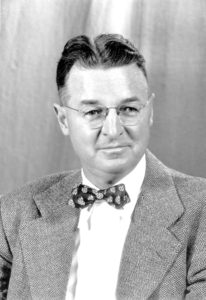1900 – 1979
Inducted 2001
“Conservation is frugality. To conserve natural resources is to be frugal in the use of them.” – Russell G. Lynch
Russell Lynch was a tough-minded editor and reporter on the Milwaukee Journal who became the nation’s first full-time natural resources reporter and turned out hundreds of stories on an expansive array of conservation topics. He focused on resource issues in Wisconsin and the U.S., and his stories sometimes brought major change and often drew national attention.
Lynch would go on to become the first chairman of the reorganized Wisconsin Natural Resources Board, appointed by Gov. Warren Knowles (WCHF Inductee) in 1967. He would earn honors and accolades while speaking forcefully and fearlessly on resources issues.
 Russell Lynch, a Racine native, had in his pocket a high school diploma and a few years ofreporting experience in his hometown and LaPorte, IN, when the Milwaukee Journal hired him as a rewrite man in 1922. Soon he was on the road, doing tough investigative pieces that packed a punch. The Journal named Lynch sports editor in 1933, and he settled into more than two decades of sports reporting. He oversaw the creation of a board of outdoor writers to contribute articles to the sports section that included Gordon MacQuarrie (WCHF Inductee).
Russell Lynch, a Racine native, had in his pocket a high school diploma and a few years ofreporting experience in his hometown and LaPorte, IN, when the Milwaukee Journal hired him as a rewrite man in 1922. Soon he was on the road, doing tough investigative pieces that packed a punch. The Journal named Lynch sports editor in 1933, and he settled into more than two decades of sports reporting. He oversaw the creation of a board of outdoor writers to contribute articles to the sports section that included Gordon MacQuarrie (WCHF Inductee).
In 1956, he requested and was granted a job change. He would become what is believed to be the first full-time natural resources reporter on a newspaper in the U.S. For the next eight years, Lynch was a prolific writer on virtually every natural resources topic imaginable.
Here are some examples of the hundreds of stories he produced, based on records in the Milwaukee Journal library: Water pollution in Wisconsin, the future of Wisconsin’s state parks, the danger of atomic energy radiation, the growth of nature centers, dam projects, flood control, sea water conversion efforts in California, Great Lakes pollution, soil conservation, wetlands destruction, threats to the Kettle Moraine State Forest, lamprey eels in Lake Michigan, state recreation needs, watershed improvement and poaching in Wisconsin.
His articles were often picked up by national sources and sometimes led to conservation reforms. A true conservationist, Lynch’s weapons were his pen and his grit.

